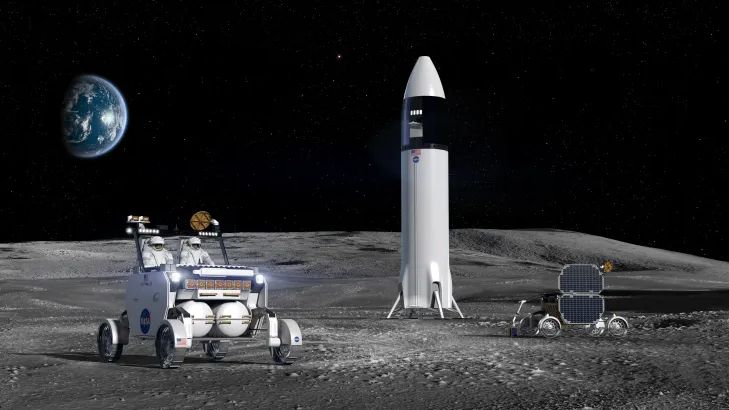In a bid to reignite lunar exploration, the United States is charting a course to return astronauts to the Moon under the ambitious Artemis programme. On Wednesday, NASA unveiled plans to enlist the services of three companies for the development of the next-generation Moon rover, essential for crewed missions slated for 2030.
Under the Artemis initiative, Texas-based Intuitive Machines, Lunar Outpost of Colorado, and Venturi Astrolab of California have emerged as contenders tasked with crafting designs for NASA’s Lunar Terrain Vehicle (LTV). The contract, with a combined maximum potential value of $4.6 billion, signifies a crucial step towards advancing human exploration beyond Earth’s orbit.
Jacob Bleacher, NASA’s chief exploration scientist, expressed enthusiasm about the project, highlighting the prospect of unprecedented lunar vistas facilitated by the LTV. “We are building up the capabilities needed to establish a longer-term exploration and presence of the Moon,” he remarked during a press briefing.
Despite being relatively new to the aerospace scene, the selected companies have forged partnerships with established industry players. Intuitive Machines, for instance, has secured an initial $30 million to advance its prototype, the Reusable Autonomous Crewed Exploration Rover (RACER), in collaboration with AVL, Boeing, Michelin, and Northrop Grumman.
Meanwhile, Venturi Astrolab and Lunar Outpost are spearheading innovative designs alongside prominent partners such as Axiom Space, Odyssey Space Research, Lockheed Martin, and General Motors. These collaborations aim to develop versatile rovers capable of enduring the harsh lunar environment while supporting scientific exploration and logistical operations.
NASA’s decision to procure services from these companies underscores a shift towards a more cost-effective approach in space exploration. By leveraging private sector expertise, the agency seeks to stimulate a burgeoning space economy while facilitating sustainable lunar exploration.
The Artemis programme, named after the sister of Apollo in Greek mythology, is poised to redefine humanity’s relationship with the Moon. While the timeline for the first crewed mission, Artemis 3, is slated for 2026, logistical challenges may necessitate adjustments to the schedule. Additionally, the emergence of China as a formidable contender in lunar exploration signals the onset of a new space race, underscoring the urgency of US efforts to establish a sustained presence on the lunar surface.
(Source: Daily Mail UK and Space.com)
